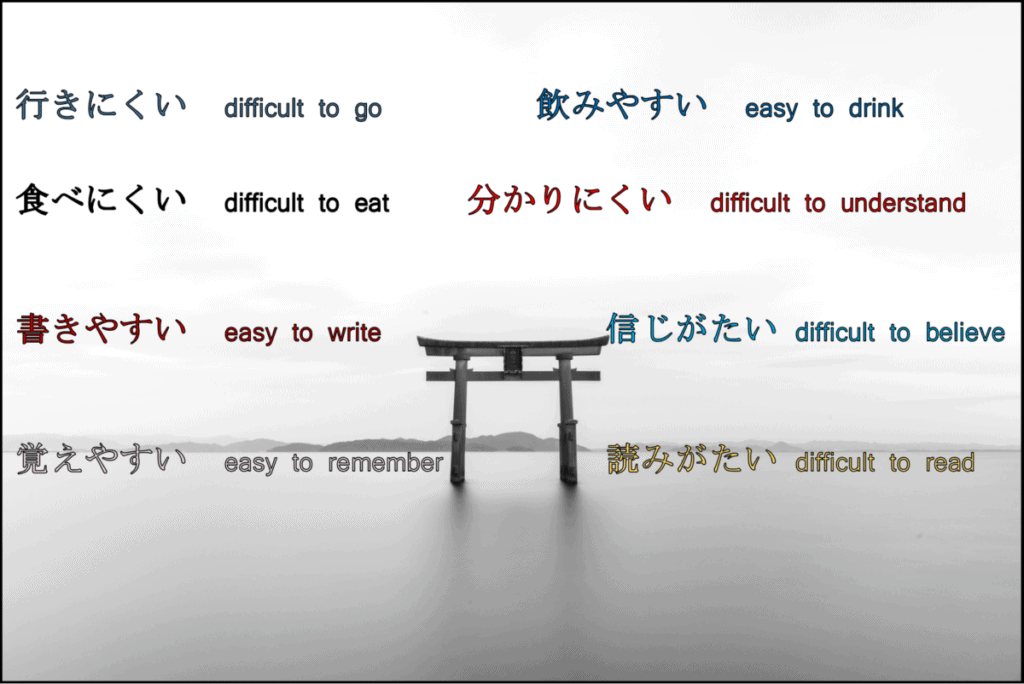Do you want to know how to say easy or difficult in Japanese? Well, it is quite easy! In this article, we will learn how to talk about difficulty in Japanese in many different ways. There are also free Japanese learning activities to test yourself.
How do you say easy and difficult in Japanese?
First, let’s start with the basics. In Japanese, “difficult” is 難しい (むずかしい). This is transliterated to “muzukashii” in the English alphabet. In Japanese, easy is 簡単 (かんたん). This is “kantan” in the English alphabet. So:
難しい Difficult.
簡単 Easy.
難しい muzukashi: difficult
If you know these two words, and the basics of Japanese grammar, then you can already make simple sentences for talking about difficulty in Japanese. Let’s look at some examples:
日本語は難しいです。
Nihongo ha muzukashii desu.
“Japanese is difficult.”
日本語は簡単です。
Nihongo ha kantan desu.
“Japanese is easy.”
日本語は難しいですか?
Nihongo ha muzukashii desuka?
“Is Japanese difficult?”
日本語は簡単ですか?
Nihongo ha kantan desuka.
“Is Japanese easy?”
Simple enough, right?
An important thing to remember is that難しい is an “i adjective,” but 簡単 is a “na adjective.” This means that they change into different forms for different tenses. See our other articles to learn about the different types of Japanese adjectives.
How to say easy and difficult in Japanese
Now, test yourself by translating the following sentences. Below each question is extra vocabulary that you will need to know. Can you understand the meaning of each sentence?
1. 数学は難しいです。
数学 = “suugaku,” mathematics
2. このゲームは簡単です。
ゲーム = “ge-mu,” game
3. 試験は難しかったです。
試験 = “shiken,” test
4. 昨日の試験は簡単だった。
昨日 = “kinou,” yesterday
5. 来週の試験は難しいと言うか、簡単と言うか、まだ分かりません。
来週 = “raishuu,” next week
言う = say
分かりません = to not understand
- 漢字を書くことが難しいです。
漢字 = “kanji,” Chinese characters
- スマホを使うことが簡単です。
スマホ = “sumaho,” smartphone
How did you do? When you are ready, check your answers below:
How to say easy and difficult in Japanese – Answers
1. 数学は難しいです。
Maths is difficult.
2. このゲームは簡単です。
This game is easy.
3. 試験は難しかったです。
The test was difficult.
4. 昨日の試験は簡単だった。
Yesterday’s test was easy.
5. 来週の試験は難しいと言うか、簡単と言うか、まだ分かりません。
I don’t yet know whether next week’s test is easy or difficult.
- 漢字を書くことが難しいです。
Writing kanji is difficult.
- スマホを使うことが簡単です。
Using a smartphone is easy.
How did you do? Don’t worry if you your translations don’t match those above exactly – as long as the meaning is the same, you’re doing great!
Did you notice that in questions 6 and 7 you are describing the difficulty of an action in Japanese? By adding こと “koto” to the dictionary form of a verb, you change it into a noun phrase and can describe it as easy or difficult. This is a useful way of making yourself understood through a simple noun phrase:
英語で書くことは難しいです。
Writing in English is difficult.
私にとって車を修理することは簡単です。
For me, repairing a car is easy.
However, this is just the start. To learn more about how to talk about difficulty in Japanese, you should read on, because next we learn about the stem endings “yasui” and “nikui.” This makes Japanese verbs much easier to use.
How to use “nikui” and “yasui” in Japanese
To learn how to talk about difficulty in Japanese, you should learn how to change the stem of a Japanese verb into “nikui” or “yasui.” All you have to do is add “nikui” to the -masu stem of a verb for “- is difficult,” or “-yasui” for “- is easy.”
First, let’s look at describing an action as difficult in Japanese:
Example:
この質問は分かりにくいです。
Kono shitsumon ha wakarinikui desu.
“This question is difficult to understand.”
私は車がないから、行きにくい。
Watashi ha kuruma ga nai kara, ikinikui.
“Because I don’t have a car, it’s difficult to go to.”
To say an action is easy in Japanese, use “yasui.” Look at the examples below:
この質問は分かりやすいです。
Kono shitsumon ha wakariyasui desu.
“this question is easy to understand.”
バスがありますから、行きやすいです。
Basu ga arimasu kara, ikiyasui desu.
“Because there is a bus, it is easy to go to.”
Let’s look at some examples. Can you translate them into English?
- この本は読みにくいです。
kono hon ha yominikui desu.
本 = “hon,” book
- このペンは書きやすいです。
kono pen ha kakiyasui desu.
- 彼の名前は覚えやすいです。
kare no namae ha oboeyasui desu.
名前 = “namae,” name
覚える = “oboeru,” remember
- この諺は、覚えやすい、分かりにくい。
Kono kotowaza, oboeyasui, wakarinikui.
諺 = “kotowaza,” Japanese proverb.
“This proverb, easy to remember, difficult to understand.”

Talking about difficulty in Japanese: Test yourself
Below are some Japanese sentences, but the words are mixed up. Can you rearrange these words into the correct order?
- 読み日本語は です にくい
2. ケーキ は 食べ です この やすい
3. 部屋 は 見 暗かった ので にくかった
- 水は やすい です ワイン より 飲み
- 彼女のは 信じ 話 にくい です
When you are ready, check your answers below:
- 日本語は読みにくいです。
Japanese is hard to read.
2. このケーキは食べやすいです。
This cake is easy to eat.
3. 部屋は暗かったので、見にくかった。
The room was dark, so it was difficult to see.
4. 水はワインより飲みやすいです。
Water is easier to drink than wine.
5. 彼女の話は信じにくいです。
Her story is difficult to believe.
Writing about Difficulty Levels in Japanese
When you are writing about difficulty in Japanese, “nikui” is often replaced by “gatai” – though both are used when speaking as well. Different regions and generations of Japanese speakers will tend to use one or the other.
For example:
彼女の話は信じがたいです。
Her story is difficult to believe.
その字は読みがたいでした。
That writing is hard to read.
答えがたい質問でした。
It was a difficult question to answer.

TEST YOURSELF IN JAPANESE: DIFFICULTY
Write these sentences in Japanese:
- This computer is difficult to use.
- His story was difficult to believe.
- The film is difficult to watch.
- His words are difficult to understand.
- For me, that name is easy to remember.
- It was a day difficult to forget.
How did you do? See our example answers below, but remember – there may be a few different ways of saying these sentences in Japanese!
- This computer is difficult to use.
このパソコンは使いにくいです。
- His story was difficult to believe.
彼の話は信じにくかった。
- The film is difficult to watch.
見にくい映画です。
- His words are difficult to understand.
彼の言葉は分かりにくいです。
- For me, that name is easy to remember.
その名前は私にとって覚えやすい。
- It was a day difficult to forget.
忘れにくい日でした。




